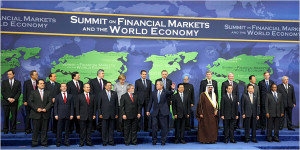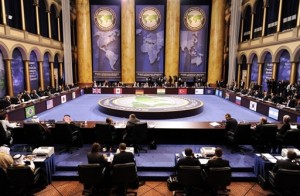A Call For Global Leadership
When the U.S. economy sneezes, the rest of the world catches cold.
When the U.S. economy catches cold, the rest of the world faces an outbreak.
The credit crisis that started in the U.S. and traveled around the world had already made French, German and British economies suffer massive bailouts, forced the government of Iceland to seize its three largest banks, deepened economic deterioration in Hungary, Poland, Ukraine and questioned economic stability of emerging markets in China, Brazil, Russia and South Korea.
The world is flat, indeed. And it seems that the era of globalization reached its zenith with the financial turmoil around the world that many countries and their governments already tried to deal with unilaterally.
Some leaders did a very good job of taking this crisis seriously and used it as an opportunity to demonstrate their leadership skills to think clearly, take the pain and enhance their image as truly global leaders.
British Prime Minister Gordon Brown was among the first leaders who timely and effectively responded to the financial crisis once it reached Europe. My colleague Fred Garcia in one of his recent posts gave a very good analysis of Mr. Brown’s response to the crisis.
French President and current head of the European Union Nicolas Sarcozy stepped forward with an initiative for the G20 summit to address the financial crisis.
Chinese President Hu Jintao earned credit for taking “bold and decisive” actions to create a $ 586 billion stimulus plan for its country.
Brazilian President Luiz Inacio Lula da Silva was praised for taking an initiative to host a group of 20 finance ministers and central bankers in Sao Paulo who came there to set up the agenda for the G20 Summit.
But there are two more lessons that every leader should and would learn from this crisis:
1. It’ll take more effort than just a rescue of a financial eco system of an individual country to recover from the crisis.
2. In a highly globalized and interconnected world that we live today, it’s essential for leaders to develop a global mindset and lead with global responsibility.
Only with understanding of global responsibility and willingness to work as one global team, the world’s leaders could restore, re-vision and re-invent a global financial architecture.
Global Crisis – Global Response
“This is a world-wide crisis and therefore we must find a world-wide solution,” said Nicolas Sarcozy in his address to world’s leaders.
The first word-wide attempt to wrestle with the financial crisis was made on November 15th when the U.S. hosted a summit of twenty world leaders. This meeting, originally called by many enthusiasts a new Bretton Woods, did not have the same historic significance as the famous meeting in Washington 64 years ago, when an international economic system was reborn. It did have a different historic significance though. It was the first meeting that had 20 leaders from developed and developing countries sitting at the same table.
Together they had to grapple with the following issues: rethinking and reorganizing rating agencies, establishing benchmarks for transparency and setting up rules for new financial order. It seemed too much for a two-day meeting. But the expectations for leaders to come up with some tangible results were very low. What was more important for the international community to have as a result of this summit was the commitment of the world’s leaders to act as a global team despite political and economic disagreements.
To act as a global team the world’s leaders should:
1. Master the ability to speak with one voice
Despite the fact that the meeting showed difference in opinions on how to build a new world financial architecture, all representatives agreed with one thing – to emerge from this crisis, the global leaders must act together and learn to speak with one voice.
Learning to speak with one voice despite conflicting political agendas is a new skill that global leaders will have to acquire and practice in a world of “globalization on steroids.”
2. Lead with global responsibility
A sad reality of globalization as formulated by T. Friedman is that “we are all connected and nobody in charge.”
I think everyone agrees that this crisis showed us how the lack of responsibility and regulation demonstrated by the leadership of one country got almost the entire world into a financial mess. Surprisingly, during the summit the participants did not openly engage into a blame game to criticize the U.S. for starting the crisis. Maybe each of them felt personally responsible for what happened in his/her own country. Or maybe they realized that it was too late to cry over spilt milk.
One thing is clear, today every world leader has responsibilities not only to the country it presides over, but to the world that country is an indispensable part of. I have nothing but to agree with T. Friedman and his vision of the future for the world and its leadership:
“It will be a world in which America will not be able to scratch its ear, let alone roll over in bed, without thinking about the impact on other countries and economies. And it will be a world in which multilateral diplomacy and regulation will no longer be a choice. It will be a reality and a necessity. We are all partners now.”
It’s early to predict what will happen during the second round of the G20 summit scheduled in April with a new President-elect Barack Obama. But the first step to solve the financial crisis was made on November 15th – the world’s leaders showed willingness to come together, speak with one voice and exercise global responsibilities.





Leave a Reply
Want to join the discussion?Feel free to contribute!